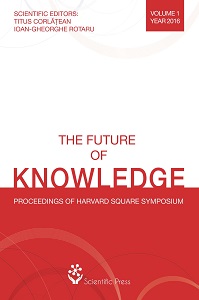
We kindly inform you that, as long as the subject affiliation of our 300.000+ articles is in progress, you might get unsufficient or no results on your third level or second level search. In this case, please broaden your search criteria.















The 20th and 21st century are characterized by a strong urge for progress in the field of technology, knowledge, communication and business. These structural changes patronized the emergence of a knowledge society, where knowledge is the basis of economic and social growth. The other side of progress is characterized by ambivalent effects. While the idea of progress is based on development and crossing the institutionalized limits, the ethics of responsibility starting from respecting the limits and the temperature, following the aim of sustainability. Hans Jonas sets with his principle the responsibility of a distinctive scale both in dealing with the present and with the future. Without an interdisciplinary exchange, the ethics of moderation proves in its action to be guidance, but only limited. The wider actual acceptance of “sustainability” reveals its chances towards becoming a global ethos.
More...
There are different venues to knowledge and their importance in the process depends very much on the worldview on holds on to. I have pointed out some ways in which both modernism and postmodernism influences someone’s hermeneutics, with predilection for theological hermeneutics. Even though a lot could be said about the core ideas of the two worldviews mentioned above, I am more interested, in this article, in highlighting how these could help out the interpreter in the process of knowing. In the same way, any other view of world, in future, would help the interpreter in ways former worldviews did not.
More...
Social influence of the religious phenomenon, is a complex phenomenon, especially in contemporary society, which takes account of certain indicators such as: context of religious freedom, religious language or religious speech, religious affiliation, religious practice; attitudes of religious groups or religious institutions on society and on social security; the impact of specific religious groups, secret societies, mysteries on the population firms. In order to be objective and to have the right attitude towards certain aspects that define contemporary society issues on the globalization, integration, secularism, atheism indifference, pluralism, it is first necessary that these issues be carefully studied, known and understood in the context of contemporary society. The phenomenon of secularization, globalization, religious indifference, not social issues but social phenomena, specific ways of expression of contemporary society.
More...
Contrary to the common opinion that Kierkegaard is a fideist, there are in fact good proofs that he offers arguments (of an ethical and existential nature) in favor of the belief in God’s existence. However, this type of philosophical justification is not classical. Evaluated through the categories of modern epistemology it may be called rather externalist than internalist. The advantage of this approach to the problem of the arguments for God’s existence is its egalitarian, eliberating and formative consequences. In addition to that, a result of this view on the belief in God (and the knowledge of his attributes) is the fact that they do not seem to depend in any way by the contingent developments of science or society; therefore, they cannot be affected and eventually deteriorated by these factors.
More...
The basic diff erence of our language – and our entire mode of thought determined by it – has not made it easy for us to fit in the European cultural sphere. The problem dawned on us only gradually, although our 17th century Cartesian teacher, János Apáczai Csere, sensed something of this. Descartes, for example, won him over not only by the content of his thought, but also by his daring to break the several centuries-old convention of Latin in order to philosophise in French. That is why Apáczai Csere started to “magyarise” Latin words in the interest of “Hungarian philosophy”. Th is was not a success.
More...
Animal suffering is an obvious consequence of different animalexperiments and factory farming. Everybody can observe the terrible online data andimages on this issue. From the birth of bioethics in the 1960s, it has become clearthat animals should get more clear-cut defence than human beings since they cannotprotest and give informed consent. The Animal Rights Movement became strongerwhen Peter Singer published Animal Liberation in 1975. Tom Regan went furtherthan Singer with his speciesism when he claimed that animals are “subject of a life”and they have moral rights. This chapter will show, in the light of modern ethology,that these views (Singer and Regan) cannot be founded philosophically, and that weshould return to Immanuel Kant’s standpoint. It is good enough to determine ourmoral relationship to animals, and above all, it is a provable standpoint.
More...